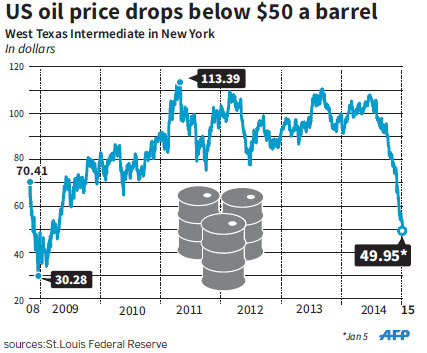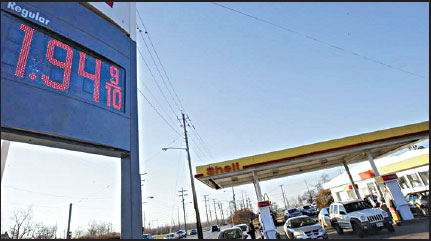Revamped oil hedges may test OPEC's patience
As a war of nerves between US shale producers and Gulf powerhouses intensifies, OPEC's biggest members are counting down the months until their upstart rivals lose the one thing shielding them from crashing oil prices - hedges.
They may need much more patience than they reckon, however, because those hedges are a moving target. Rather than wait for their price insurance to run out, many companies are racing to revamp their policies, cashing in well-placed hedges to increase the number of future barrels hedged, according to industry consultants, bankers and analysts familiar with the deals.
OPEC officials hope that once the United States' oil companies get fully exposed to the impact of an over 50 percent slide in crude prices since last June, they will have to drill fewer new wells, causing US production growth to stall and putting a floor under oil prices now testing $50 a barrel.
"There are companies which are hedged until the beginning of the year or until the end of the year, so we need to wait at least until the first quarter to see what is going to happen," United Arab Emirates Energy Minister Suhail Bin Mohammed al-Mazroui told Reuters last month.
Yet that hope is based largely on quarterly company reports from several months ago, when drillers last made their hedging portfolios public. In the meantime, with the price rout showing no sign of reversing, at least some firms have put on new hedges that will help prevent their revenues from falling further - and allow them to drill far longer this year than earlier expected.
"OPEC should not expect to see any impact on US shale growth in the first half of the year and the impact in the second half is being attenuated significantly by producer hedging," said Ed Morse, global head of commodities research at Citigroup, one of the biggest US banks involved hedging.
New hedging strategies are only likely to get disclosed in quarterly earnings reports in late January.
"It's a hot topic of discussion that everyone is thinking about and looking at," said Craig Breslau, who heads the energy derivatives marketing desk at Societe Generale in Houston, which has been involved in some restructuring transactions.
While the proportion of oil companies actually executing those deals is not that high, the deals thus far have been large in terms of volume and dollars, he said.
According to their last filings, oil companies such as EOG Resources Inc, Anadarko Petroleum Corp, Devon Energy Corp and Noble Energy Inc had hedged some of their 2015 production at prices of $90 a barrel or more.
The net short position of oil producers and other non-financial companies in US crude oil futures and options markets - used as a rough gauge of hedging activity - has grown from 15 million barrels in August to more than 77 million barrels last week.
|
A price of $1.94 per gallon for regular gas is advertised in Cleveland on Dec 31. Provided To China Daily |

(China Daily 01/07/2015 page18)



















